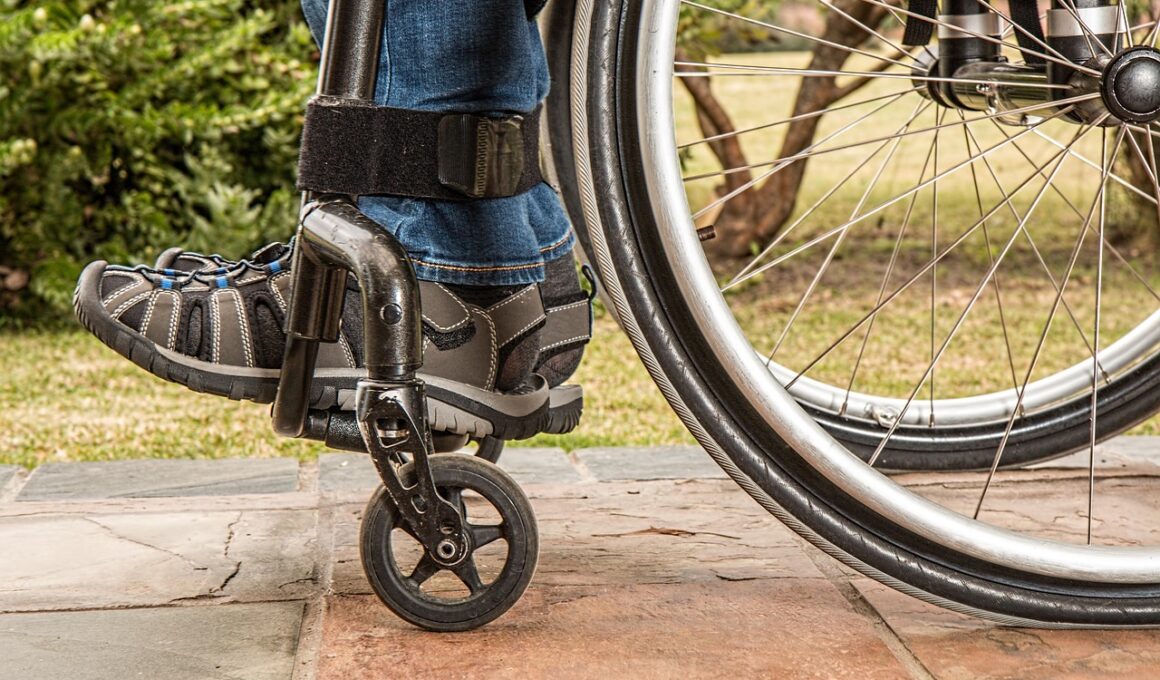Tracking Functional Outcomes After Surgery
After surgery, effective rehabilitation is crucial for restoring physical functionality. Post-surgical rehabilitation focuses on promoting recovery and is tailored to meet individual patient needs. Tracking functional outcomes after surgery provides invaluable data that can improve treatment protocols. This data helps identify how well the surgical intervention adheres to predefined recovery goals. By evaluating various standardized measures, rehabilitation professionals can accurately assess patient progress during recovery. Utilizing tools such as surveys and performance tests offers quantifiable insights into the healing process. Additionally, functional outcomes can enhance communication among surgical teams and rehabilitation staff. It promotes a multidisciplinary approach essential for managing patient care optimally. Functionality measures include range of motion, strength, and endurance assessments. Furthermore, monitoring outcomes allows clinicians to make necessary adjustments based on patient feedback and performance levels. Capturing these metrics not only standardizes care but also drives evidence-based practices. In essence, functional outcome tracking enhances patient experiences, setting the foundation for further innovation in rehabilitation protocols and overall injury prevention strategies in post-surgical settings.
Evaluating the functional outcomes involves various assessment methods to gauge recovery benchmarks. Clinicians often implement functional assessments, which can include predictive and descriptive statistics that focus on outcomes over time. These evaluations should consider the type of surgery, patient’s age, and overall health status. Objective evaluations like goniometry, dynamometry, and functional movement tests yield solid data tracking recovery progression. Research indicates that setting realistic expectations significantly enhances patients’ rehabilitation experiences. Understanding the stages of recovery ensures patients remain motivated throughout the process. Primary components under evaluation include pain levels, mobility, and the ability to perform daily activities as they gradually recover. Healthcare professionals should incorporate patient input to assess satisfaction levels related to therapy effectiveness. This collaborative approach fosters a supportive environment and increases adherence to rehabilitation protocols. Moreover, identifying potential setbacks during recovery is crucial in preventing prolonged dysfunction or secondary injuries. Implementing patient-centered care strategies enables tailored rehabilitation programs based on specific needs and challenges. Reviewing results on functional outcomes not only measures recovery success but helps improve future rehabilitation practices.
The Role of Technology in Tracking Outcomes
Technology has transformed tracking functional outcomes post-surgery, facilitating data collection and analysis. Digital tools such as mobile applications and wearable devices assist in monitoring recovery. These innovations allow patients to log pain levels, mobility metrics, and even daily activities conveniently. Some rehabilitation platforms enable real-time updates for healthcare professionals, promoting remote monitoring. This asynchronous approach reduces barriers to effective communication and allows clinicians to adjust care plans promptly. Analytics integrated into apps can identify trends in a patient’s recovery trajectory over time, highlighting potential issues early. Advanced algorithms help process data inputs, providing insights based on the collected metrics. Such tech-enabled flexibility enhances patient engagement and accountability while simultaneously streamlining clinician workflows. Furthermore, virtual appointments have emerged as viable options, offering enhanced accessibility for patients unable to attend in-person consults. Remote patient monitoring fosters a proactive approach, ensuring that professionals can address challenges at each stage effectively. Ultimately, employing technology in tracking functional outcomes leads to improved rehabilitation protocols and overall satisfaction.
Effective communication plays a pivotal role in rehabilitation success. Health professionals should ensure clarity and consistency in conveying information about recovery expectations. Building rapport with patients helps foster trust, which is essential for adherence to rehabilitation plans. This trust encourages open discussions about difficulties faced during recovery, allowing professionals to customize interventions accordingly. In addition, scheduling regular evaluations forms an intrinsic part of the recovery journey. Patients should be encouraged to express their perspectives based on the milestones established before surgery. Regular reassessments help in gauging the effectiveness of the rehabilitation process and adjust treatment plans as needed. Clinicians must emphasize prehabilitation, outlining exercise routines before surgery that can boost recovery outcomes. Strengthening the musculoskeletal system can significantly impact post-operative rehabbing efforts. Health professionals should empower individuals to take charge of their healing journey through education and support, creating stronger partnerships around their health. The collaborative approach culminates into not only enhanced functional outcomes but also an overall improved quality of life for patients following surgery.
Long-term Impacts of Successful Rehabilitation
Successful rehabilitation post-surgery extends far beyond immediate functional recovery. Long-term impacts of achieving functional outcomes play a crucial role in determining the sustainability of successful interventions. Adequate follow-up mechanisms with structured support ensure patients don’t regress in their progress post-rehabilitation. The importance of patient education cannot be overstated; understanding the rationale behind exercise regimens influences motivation and adherence. Preventive strategies integrated into recovery plans can help mitigate future injuries or other complications. Regular participation in targeted activities also enhances overall fitness levels and quality of life, as well as reduces health risks. Peer support groups can provide ongoing encouragement to patients navigating similar journeys. Social interactions foster motivation and shared experiences of recovery challenges, creating a healthier mental environment. Furthermore, valuable insights gained through tracking functional outcomes can inform future surgeries, potentially improving techniques and specialized rehabilitation practices. It drives meaningful advancements in postoperative care and helps refine best practices across healthcare disciplines. Hence, the long-term benefits of successful rehabilitation hinge on a dynamic focus on holistic approaches combining functionality and emotional well-being.
In conclusion, tracking functional outcomes after surgery is an essential component of post-surgical rehabilitation. It not only assists healthcare providers in monitoring rehabilitation but also empowers patients by involving them actively in their recovery journey. The synergistic relationship between tracking methods and structured rehabilitation plans contributes significantly to successful recoveries. Data-driven decisions bolster rehabilitation practices while enhancing patient satisfaction. Effective tracking outcomes lead to higher adherence rates and reduced risk of adverse outcomes, establishing it as a crucial factor in rehabilitation success. Keeping abreast of technological advancements allows healthcare providers to innovate and implement best practices continually. Ultimately, both the physical and mental aspects of recovery must be prioritized to yield optimal results. Collaboration among medical teams and patients creates a robust support framework essential for ensuring comprehensive care. Continuous feedback loops between patients and health professionals bolster recovery strategies and provide insights for future protocols. As the dynamic landscape of healthcare evolves, so too must our methodologies in tracking and supporting functional outcomes after surgery. This progress holds the key to unparalleled advancements in post-surgical rehabilitation and injury prevention.
Future Directions in Rehabilitation Research
The future of rehabilitation research is promising, particularly in enhancing tracking functional outcomes post-surgery. Emerging technologies such as artificial intelligence and machine learning are poised to transform data analysis and outcome predictions. Leveraging these innovations can provide deeper insights into patient data, driving personalized approaches in rehabilitation. Further, research focused on the integration of interdisciplinary methods will likely yield more comprehensive rehabilitation models. Synthesizing methodologies from various fields will allow practitioners to create multifaceted treatment plans addressing individual patient needs holistically. Collaborative studies targeting outcomes across demographics will deepen our understanding of how surgery recovery varies. Continued qualitative research will help illuminate patients’ emotional and psychological responses during recovery. Insights based on these experiences will be instrumental in developing more empathetic care systems. Engaging patients as active partners in research makes it more inclusive and responsive to real-world challenges. The future lies in creating adaptive rehabilitation programs that evolve with ongoing feedback and emerging needs. As we build upon our existing foundation in postoperative recovery practices, focusing on innovation will ensure optimal functional outcomes for all patients undergoing surgical interventions.
The ongoing discourse in evaluation methodologies for functional outcomes needs to prioritize inclusivity and diversity. By standardizing assessments that reflect varied backgrounds and abilities, rehabilitation practices will become universally applicable. Enhancing the understanding of unique patient experiences positions health professionals to design better recovery interventions. Evidence-based frameworks set against the backdrop of individualized care will lead to enhanced recovery strategies. As the focus on functional outcomes deepens, so too must the related educational resources directed at patients, medical staff, and caregivers. Comprehensive training tools will equip stakeholders with knowledge, fostering adaptive practices across rehabilitation settings. Emphasizing the importance of patient feedback in institutional policies will be vital for evolving rehabilitation practices. As we aim for improved recovery outcomes, our goals should encompass societal factors influencing rehabilitation success. Addressing social determinants of health enhances the effectiveness of rehabilitation programs, promoting equitable access to resources. Building a framework that constantly incorporates patient perspectives will lead to a dynamic rehabilitation landscape. This adaptive environment acknowledges ongoing changes and embraces the multifactorial aspects of functional outcomes after surgery, ensuring timely interventions tailored for every unique experience.


